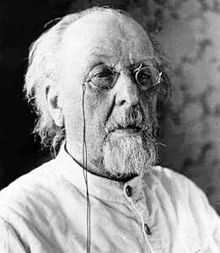Russian cosmism

Russian cosmism was a philosophical and cultural movement that emerged in Russia in the early 20th century. It entailed a broad theory of natural philosophy, combining elements of religion and ethics with a history and philosophy of the origin, evolution and future existence of the cosmos and humankind. It combined elements from both Eastern and Western philosophic traditions as well as from the Russian Orthodox Church.
Cosmism was one of the influences on Proletkult, and after the October Revolution, the term came to be applied to "the poetry of such writers as Mikhail Gerasimov and Vladimir Kirillov...: emotional paeans to physical labor, machines, and the collective of industrial workers ... organized around the image of the universal 'Proletarian,' who strides forth from the earth to conquer planets and stars."[1] This form of cosmism, along with the writings of Nikolai Fyodorov, was a strong influence on Andrei Platonov.
Many ideas of the Russian cosmists were later developed by those in the transhumanist movement. Victor Skumin argues that the Culture of Health will play an important role in the creation of a human spiritual society into the Solar System.[2][3]
The Culture of Health is the basic science about Spiritual Humanity. It studies the perspectives of harmonious development of "Spiritual man" and "Spiritual ethnos" as a conscious creator of the State of Light into the territory of the Solar System" (by Skumin).
Representatives
Among the major representatives of Russian cosmism was Nikolai Fyodorovich Fyodorov (1828—1903), an advocate of radical life extension by means of scientific methods, human immortality and resurrection of dead people.
Konstantin Tsiolkovsky (1857—1935) was among the pioneers of theoretical space exploration and cosmonautics. In 1903, he published Изслѣдованіе міровыхъ пространствъ реактивными приборами (The Exploration of Cosmic Space by Means of Reactive Devices [Rockets]), the first serious scientific work on space travel. Tsiolkovsky believed that colonizing space would lead to the perfection of the human race, with immortality and a carefree existence. He also developed ideas of the "animated atom" (panpsychism), and "radiant mankind". In 1881 Russian revolutionary and rocket pioneer Nikolai Kibalchich proposed an idea of rocket propulsion by combustion of explosives, which was an early precursor for Project Orion.
Other cosmists included Vladimir Vernadsky (1863—1945), who developed the notion of noosphere, and Alexander Chizhevsky (1897—1964), pioneer of "heliobiology" (study of the sun’s effect on biology).[4][5][6] A minor planet, 3113 Chizhevskij (discovered by Soviet astronomer Nikolai Stepanovich Chernykh in 1978) is named after him.[7]
Quote
| Wikiquote has quotations related to: Konstantin Eduardovich Tsiolkovsky |

From the Famous quotes by Brain website:[8]
| “ | The Earth is the Cradle of the Mind—but one cannot eternally live in a cradle. | ” |
See also
- Russian Futurism
- Russian philosophy
- Sobornost
Reading
| Part of the Ideology series on |
| Transhumanism |
|---|
 |
| Overviews |
| Currents |
| Politics |
| Organizations |
| Transhumanism portal |
- Nikolai Fyodorov: Studien zu Leben, Werk und Wirkung (Nikolai Fyodorov: Studies to his Life, Works and his Influence) :by Michael Hagemeister:(München: Sagner, 1989):ISBN 3-87690-461-7:Originally presented as the author’s thesis (doctoral) — Philipps-Universität Marburg, 1989.
- Michael Hagemeister: Russian Cosmism in the 1920s and Today. In: Bernice G. Rosenthal (ed.): The Occult in Russian and Soviet Culture (Ithaca, London: Cornell UP, 1997), pp. 185–202.
- Young, George M. The Russian Cosmists: The Esoteric Futurism of Nikolai Fedorov and His Followers. New York: Oxford University Press, 2012.
Citations
- ↑ Thomas Seifrid, A Companion To Andrei Platonov's The Foundation Pit (Academic Studies Press, 2009: ISBN 1-934843-57-1), pp. 69-70.
- ↑ Kovaleva E. A. (2009). "Педагогический совет. Культура здоровья учащихся как фактор здоровьесберегающей среды школы. Слайд 7" [Pedagogical Council. Slide 7 of the presentation "culture of health" to the lessons of physical education on the theme the "Health"]. 900igr.net. Retrieved November 19, 2014.
- ↑ "Культура здоровья" [Culture of health]. Wikisfera.net. Retrieved November 19, 2014.
- ↑ L. V. Golovanov, Alexander Chizhevsky entry in the Great Russian Encyclopedia, Moscow, 2001 edition. See Google.Translate version of the article from the Russian version of the Encyclopedia.
- ↑ Soiuz Pisatelei, Soviet literature, Issues 1-6, p 188, Foreign Languages Publishing House, 1982.
- ↑ James T. Andrews, “Red cosmos: K.E. Tsiolkovskii, grandfather of Soviet rocketry”, Issue 18 Centennial of Flight Series, p 114, Texas A&M University Press, 2009, ISBN 1-60344-168-9, ISBN 978-1-60344-168-1
- ↑ Dictionary of Minor Planet Names - p.257
- ↑ Tsiolkovsky, Konstantin. "Konstantin E. Tsiolkovsky quotes". ThinkExist.com Quotations. ThinkExist.
External links
- R. Djordjevic Russian Cosmism (with the Selective Bibliography) and its Uprising Effect on the Development of Space Research (PDF)
- Brief overview of Russian philosophy
- PHILTAR - Comprehensive web site with links to texts and resources
- Gallery of Russian Thinkers edited by Dmitry Olshansky
- Russian philosophy - entry in the Internet Encyclopedia of Philosophy.
- Directory of links to Russian philosophers, mostly in Russian
- Tsiolkovsky's Imperative in the 21st Century Academic paper
- Virtual Matchbox Labels Museum - Russian labels - Space - Page 2 - Konstantin Tsiolkovsky Historic images
- Tsiolkovsky from Russianspaceweb.com
- Spaceflight or Extinction: Konstantin Tsiolkovsky Excerpts from "The Aims of Astronautics", The Call of the Cosmos
- The Foundations of the Space Age
- Roerich. The Call Of Cosmic Evolution
- World Organisation of Culture of Health
| Wikimedia Commons has media related to Konstantin Tsiolkovsky. |
| Wikisource has original text related to this article: |
| ||||||||||||||||||||||||||||||||||||||||||||||||||||||||||||||||||||||||||||||||||||||||||||||||||||||||||||||||||||||||||||||||||||||||||||||||||||||||